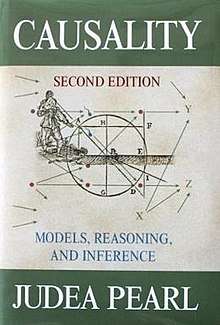Causality (book)
Causality: Models, Reasoning and Inference (2000; updated 2009) is a book by Judea Pearl.[1] It is an exposition and analysis of causality.[2][3] It is considered to have been instrumental in laying the foundations of the modern debate on causal inference in several fields including statistics, computer science and epidemiology.[4] In this book, Pearl espouses the Structural Causal Model (SCM) that uses structural equation modeling.[5] This model is a competing viewpoint to the Rubin causal model. Some of the material from the book was reintroduced in the more general-audience targeting The Book of Why.
 | |
| Author | Judea Pearl |
|---|---|
| Language | English |
| Subject | Causality |
| Publisher | Cambridge University Press |
Publication date | 2000, 2009 |
| Pages | 484 |
| ISBN | 978-0521895606 |
Reviews
Pearl succeeds in bringing together in a general nonparametric framework the counterfactual tradition of causal analysis with the variants of structural equation modeling worth keeping. The graph theory that he uses to accomplish this fusion is often elegant. Thus, Causality is a major statement, which all who claim to know what causality is must read.
References
- Pearl, Judea (June 18, 2009). "Giving Computers Free Will". Forbes. Archived from the original on January 12, 2020. Retrieved January 12, 2020.
- McArdle, Megan (May 11, 2012). "When Correlation Is Not Causation, But Something Much More Screwy". The Atlantic. Archived from the original on August 18, 2019. Retrieved January 12, 2020.
- Chin, Matthew (July 22, 2016). "Solving big data's 'fusion' problem". UCLA. Archived from the original on October 16, 2019. Retrieved January 12, 2020.
- Porta, Miquel (October 17, 2014). "The deconstruction of paradoxes in epidemiology". OUPblog. Archived from the original on September 26, 2019. Retrieved January 12, 2020.
- Hoover, K. (2003). The Economic Journal, 113(488), F411–F413. Retrieved from https://www.jstor.org/stable/3590225
- Morgan, Stephen L. "Invited review of Causality: Models, Reasoning, and Evidence by Judea Pearl". Sociological Methods & Research. 32 (2): 411–416.